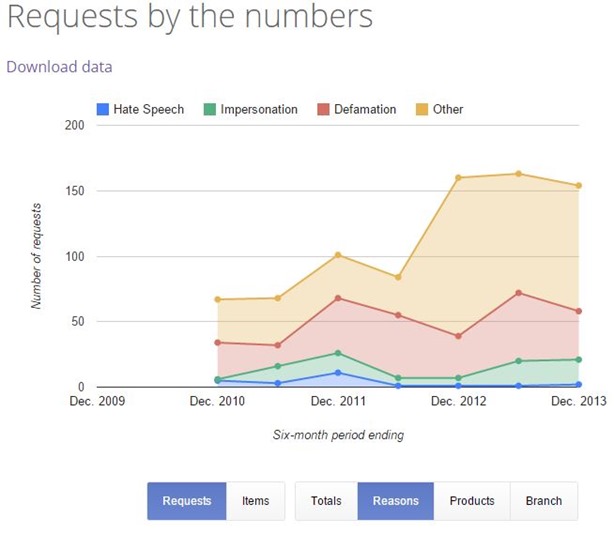Google Reveals Content Indian Govt Asked Them To Remove: Transparency Report 2014
It is not a hidden fact that Governments of various countries ask Google and other Internet giants to remove specific content which they declare as anti-national or against their beliefs and worldview.
We have earlier reported that last year, Government of India had made 2513 requests regarding content removal, 60% of which were actually removed. During the first half of this year, 2794 requests for content removal was submitted to Google from the Indian Government, 61% of which were compiled by Google.
Inspired from Google, Facebook also released their own Transparency Report, according to which 4765 pieces of content were requested by the Indian Government to be removed during October 2013 – April 2014. Even Microsoft released their Transparency Report, as per which 416 requests for content removal was shared with them by the Indian Government during July-December 2013.
The most striking feature of these Transparency Reports is that, the numbers are increasing every month.
As of now, no Internet company has ever shared what exact content was asked by the Government to be removed; thereby only sharing the numbers related with such takedown requests.
However, for the latest Transparency Report for 2014, Google has decided to share some more details about the content which was asked for removal, along with their call to action for such requests.
Let’s figure out what our Government is scared of, and what happened to such requests:
Contents
1) Period: July – December 2013
Removal Request: A Government representative approached Google to take down one Youtube video, which showed a prospective candidate using illegal financial methods to gain his vote share.
Google’s Action: They didn’t remove the video as the request for removal hadn’t come from proper legal channels.
2) Period: July to December 2013
Removal Request: Indian Police approached Google to remove a blog post wherein a leading politician’s sex scandal was revealed. The police took help of an ancient ‘local obscenity law’ to take down the blog.
Google’s Action: They didn’t remove the blog as the subjects in the video were not identifiable.
3) Period: July to December 2013
Removal Request: Indian Police asked Google to remove results for a particular search term, which displayed a logo which had replaced: “Truth Alone Triumphs” with “Bribe alone Triumphs.” (Police Logo)
Google’s Action: They didn’t take any action as the request was not sent via proper legal channels.
4) Period: July to December 2012
Removal Request: Indian Computer Emergency Response Team sent 5 content removal requests to Google, which included content from Google+, a Blogger blog, 64 YouTube videos, and 1759 comments associated with some YouTube videos. The request was placed as these thoughts were disrupting law and order situation in the country
Google’s Action: They removed one video for violating YouTube Community Guidelines; Restricted 47 Youtube Videos from local view, removed 12 YouTube comments and disabled local access to 3 Blogger blog posts that violated local laws.
You can find the complete list of takedown requests, sorted by countries right here.
Here is a look at requests made by Indian Government since December 2010 categorized by reasons for making the requests.

In a separate blog post, Trevor Callaghan, Director, Legal Department in Google shared that between June to December 2013, Google had received 3105 requests from Government to remove 14637 pieces of content. Russia reported the fastest increase in removal requests (25% increase), followed by Thailand and Italy.
As per Trever, during the 2nd half of 2013, the top three topics which attracted most of the removal requests were: Blogger (1066 requests); Search results (841 requests) and Youtube videos (765 requests). The top three reasons for removal requests are: Defamation(38%); Nudity (16%) and Privacy (11%).
He said, “Our Transparency Report is certainly not a comprehensive view of censorship online. However, it does provide a lens on the things that governments and courts ask us to remove, underscoring the importance of transparency around the processes governing such requests.”
